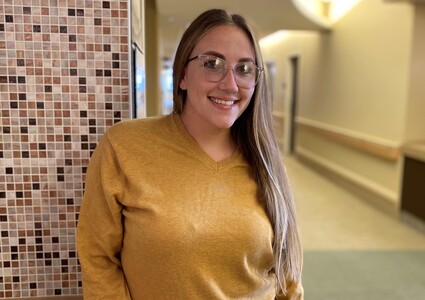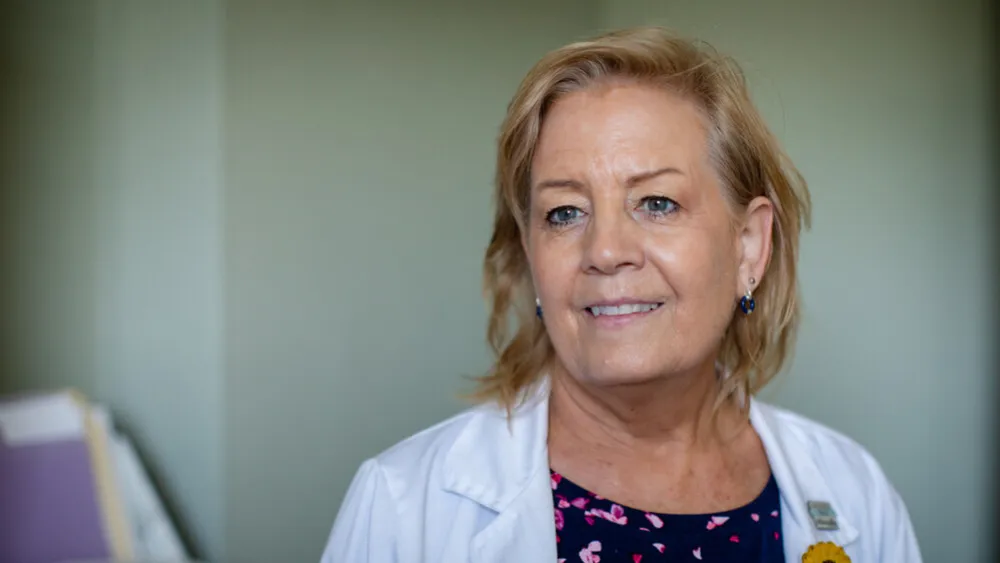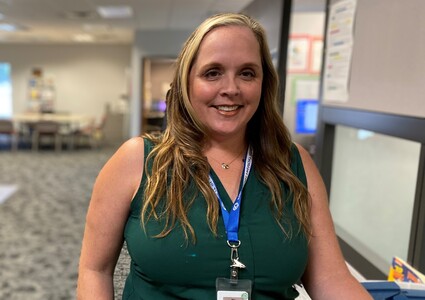





Today's Medicine
Methodist Social Workers Go Above and Beyond as ‘Unsung Heroes’ of Patient Care Team
Published: Aug. 22, 2022

Dee Wicks, a medical social worker at Methodist Jennie Edmundson Hospital. Photo by Daniel Johnson.
Dee Wicks, LBSW, has been a social worker at Methodist Jennie Edmundson Hospital for 35 years. But when she began college, her path wasn’t so clear.
Wicks enrolled at Kansas State University with hopes of becoming a child psychologist but eventually decided to study social work. Her goals became even more focused while she took a class on death and dying.
“It just was definite to me that I needed to go into health care in some form,” she said. “I felt like it was one of those aha moments where God was giving me direction, and I’ve never questioned it since.”
Today, Wicks is part of a team of social workers at Methodist Health System’s four hospitals. Depending on a patient’s or family’s needs, Methodist social workers may act as a discharge planner, set up hospice services, connect them to community resources, listen intently or offer a shoulder to cry on.
“I think they’re the unsung heroes,” said Kayleen Parys, MSN, RN, OCN, the service leader for care management at Methodist Hospital and Methodist’s Women’s Hospital. “They are so much part of the patient care team. I don’t think people realize how much they do go above and beyond for patients.”
Showing Patients and Families Their Options
For Wicks, one priority rises above all others – “to be an advocate for the patient and families.”
While no two days are the same, she frequently helps them navigate solutions for dialysis, home health care and hospice. She also connects patients and their families with a range of community services, such as programs devoted to transportation assistance or prescription drug costs. She likens her role to being the hub of the patient care team.
“You have all the spokes that go out – the doctor, the patient, the family, the transportation, the agencies – and we kind of pull it all together for their psychosocial needs and discharge planning.”
For patients and families focused on the here and now at the hospital, having a social worker like Wicks to guide them through their next steps is crucial.
“Most of the time, the families are under so much stress. They have so many pressures on them,” Wicks said. “They might not have the knowledge, or they don’t know how to pull it together. I always tell families that you can’t choose an option if you don’t know what they are. The social worker helping you, giving you resources to learn about – it gives you options. Even if you don’t want them right now, it gives you an opportunity to make choices in your life.”

An Advocate for Babies
At Methodist Women’s Hospital, medical social worker Izzy Ducey, LMHP, is also focused on setting patients up for success after discharge. But many of her patients are at a stage of life that most would consider more joyful – childbirth.
“I think it’s important because people think having a baby is a blessing and super exciting time,” she said. “And it is for a lot of women. A lot of people have the support and resources that they need – but a lot of people don’t. It’s important to have somebody that’s checking in on these women. It’s a potentially tough time. I’m making sure they have what they need and that they feel prepared.”
Ducey routinely checks with patients to see if they may benefit from continuing care from organizations like the Visiting Nurse Association (VNA). She connects many families with local food and diaper banks, and the Women, Infants and Children (WIC) program for nutritional support. She offers information about Zoom support groups for new mothers, and she provides patients with a packet that includes information on housing and utility assistance, resources for used baby supplies, and more.
“We’re going to talk about all of the things you might need or that are important that revolve around pregnancy and having babies,” she said. “Sometimes there are unfortunate situations that come in. But I really take pride in my work, and I’m passionate about advocating for these babies to make sure that they’re being set up for success and they’re safe.”
Just as important as a baby’s care is their mother’s physical, mental and emotional well-being.
“We’re frequently talking about mental health,” she said. “That’s something we want to reiterate with every patient we see. How they’re feeling. Any past history. You can pretty much guarantee that we’re going to provide you some resources about symptoms and things to look out for.”
Some patients, however, don’t necessarily need help after discharge. They simply need to connect with someone. Building relationships with new mothers or the gynecological patients Ducey visits at Women’s is the most rewarding part of her job.
“Just those patients who don’t have that much support and sometimes just need to talk to somebody,” she said. “It’s the little things. You feel like you just made a difference by listening to someone.”

In any Situation
While many Methodist social workers see patients and families within the system’s hospitals, Stephanie Phillipson, LCSW, visits those in need of or receiving hospice care – wherever they may be.
As a medical social worker with Methodist Fremont Health Hospice, she’s traveled 45 miles in every direction from Fremont to visit people in their homes, skilled nursing facilities, assisted living facilities and other settings. Sometimes she’s visiting patients at Methodist Fremont Health or the adjacent Dunklau Gardens, which offers services that include hospice care.
Regardless of the setting, she knows how difficult these moments can be.
“When people are navigating the health system, especially when they get to me in hospice, these are the hardest decisions they’re going to make as a person and a family member,” said Phillipson, who was a social worker at Methodist Hospital before moving to her current role two years ago. “I always try to make it very clear that I don’t care about what led you here. I’m going to give you the same kind of care, compassion, kindness and energy that I would give any person. I’m here to support the patient and family no matter what the situation is.”
Like her colleagues across the system, she’s focused on connecting patients with the resources they need for their unique situations – often financial assistance or mental health services. And, like so many of her colleagues, she finds the most value in the relationships she builds and unforgettable moments with patients.
She treasures memories of the time she helped Dunklau Gardens staff arrange for kolaches and a polka band for a patient’s 90th birthday.
“It was the coolest thing I’ve ever done as a social worker. It was awesome.”
She’ll never forget how she helped transfer a patient nearing the end of his life to a Lincoln facility, closer to family and friends, so he could say his goodbyes.
“It was a huge deal. It took a lot of time, work and energy, but he had that one day that he wanted.”
Those are the moments that drive Phillipson and other Methodist social workers.
“We’re not in it because we’re making the big bucks,” she said. “We’re in it because we value the human experience, and for being able to provide support and being able to be present for patients and families. That’s the most important thing for me.”
Wicks echoes those thoughts.
“I have never considered not staying in this profession,” she said. “I believe it was my calling, and I have always felt that this is where I needed to be and wanted to be.”
More Resources
- Read more stories about the unsung heroes across Methodist Health System.
- Read more inspiring stories about Methodist patients and staff members.


